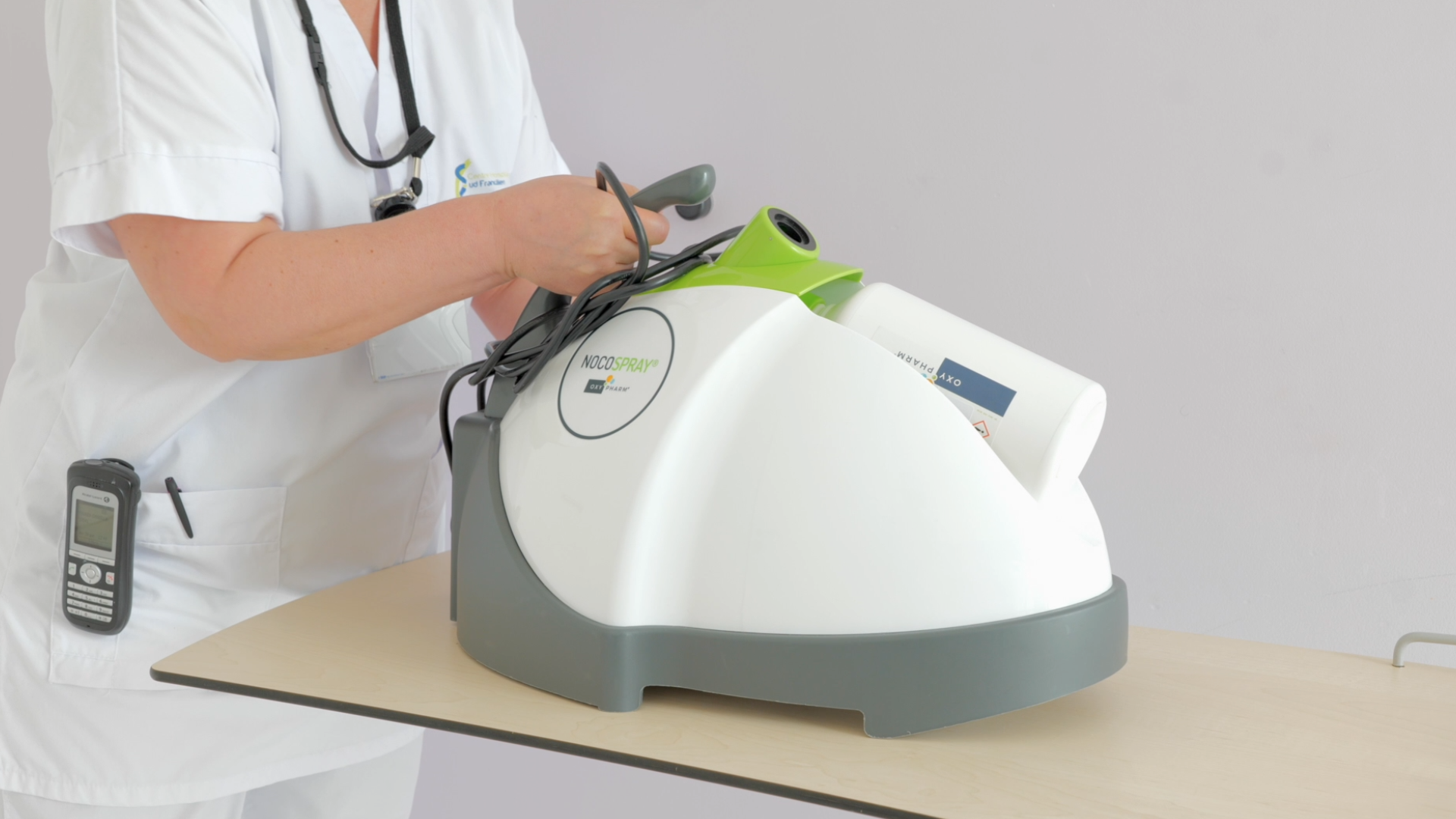Oxy’Pharm: Proven International Expertise in the Hospital Sector with Nocotech
Combating healthcare-associated infections (HAIs) is a top priority for hospitals around the world. However, ensuring the safety of hospitalised patients is a real challenge, particularly in sensitive departments such as intensive care and organ transplant units. Oxy’Pharm, a renowned expert in steam bio-cleaning and automated surface biodisinfection for more than 20 years, provides an innovative response to this challenge. With an extensive presence in more than 120 countries, Oxy’Pharm’s export team outside Europe recently rolled out its Nocotech technology in two hospitals in Brazil. Read on to discover how effective it was in disinfecting a neonatal intensive care unit and a liver transplant unit.

Nocotech: Successful Disinfection at the Neonatal Intensive Care Unit at Santa Casa Hospital in Porto Alegre, Brazil
In March 2024, the neonatal intensive care unit at the Santa Casa hospital in Porto Alegre was tackling an epidemic of Pseudomonas aeruginosa. To control the epidemic, the Brazilian hospital decided to experiment with biodisinfection using dry hydrogen peroxide vapour (HPV). Oxy’Pharm’s Nocotech solution was chosen.
The “no-touch” disinfection method was selected, with dry steam biodisinfection based on 6% hydrogen peroxide and silver ions using the Nocospray application device.
Samples of surfaces and equipment were taken with a microbiological sponge both before and after the disinfection, and analysed in the hospital’s microbiology laboratory. The results were as follows:
- Prior to environmental disinfection, microbiological analyses revealed contamination including: Pseudomonas aeruginosa, Staphylococcus caprae, Enterobacter kobei, Acinetobacter baumannii, Enterococcus faecalis, Staphylococcus capitis, Lysinibacillus spp. and Candida parapsilosis.
- In the post-procedure analysis, only Enterococcus faecalis and coagulase-negative Staphylococcus were identified.
The results of the study demonstrate two things: the effectiveness of the Nocotech solution in managing nosocomial epidemics in neonatal environments, and the ease with which the technology can be applied
Oxy’Pharm in Brazil: The Liver Transplant Unit at the Hospital do Rocio
The increase in the frequency of post-transplant infections attributed to multi-drug resistant organisms (MDRO) represents a generalised threat to public health, and Brazil is no more immune than other countries. What’s more, liver transplantation contributes to all the major risk factors for MDRO colonisation and infection. Colonisation and infection by MDRO in these highly vulnerable patients have a negative impact on clinical prognosis (with higher complication and mortality rates).
To address this problem, the Hospital do Rocio in Campo Largo decided to use disinfection with hydrogen peroxide vapour (HPV) to address rectal colonisation by MDRO in liver transplant patients. The Brazilian liver transplant unit opted for Oxy’Pharm’s biodisinfection technology and studied the effects of the French Nocotech solution on MDRO colonisation and patient outcomes.

The study demonstrated several things. Firstly, the frequency of negative control samples with the use of the Nocotech solution rose from 34.48% in the bHPV group (before disinfection) to 55.17% in the aHPV group (after disinfection). The results obtained highlighted the reduction in HCAIs and the isolation of microorganisms.
Secondly, given that bacterial infections are the main cause of death (up to 60%) in the first 90 days following liver transplantation, a comparative analysis was also carried out. The relationship between the frequency of HCAIs and 90-day mortality rates in transplant patients with negative and positive control samples was then examined.
The results showed that among the patients studied:
- with negative control samples, HCAIs occurred in 16.67% of cases.
- with positive control samples, HAIs occurred in 57.14% of cases.
Finally, the study also revealed that patients with a negative sample were able to leave hospital on average ten days sooner than those with a positive sample. This difference was shown to be significant from the eighth day of hospitalisation.
Nocotech’s HPV disinfection technology, used in the liver transplant unit at the Hospital do Rocio in Brazil, has proved effective in reducing rectal colonisation by MDRO and in reducing the length of hospital stays and patient mortality after disinfection compared with before.
Nocotech: Innovative French Technology with Proven Effectiveness in Hospital Environments
Nocotech is an automated surface biodisinfection solution based on the combined action of a treatment device (Nocospray) and a hydrogen peroxide-based disinfectant (Nocolyse +).
This diffusion concept created by Oxy’Pharm provides complete and perfect airborne disinfection of all surfaces, including hard-to-reach areas and surfaces that are difficult to keep sterilised. The Nocospray-Nocolyse combination complies with automated airborne surface disinfection standard EN 17272 (bactericide, fungicide, sporicide and virucide).
The Nocotech system also has the advantages of being completely biodegradable, harmless to human health and environmentally friendly.
Thanks to Nocotech technology, Oxy’Pharm is continuing to prove that innovation and efficiency go hand in hand, ensuring a safer hospital environment while guaranteeing the safety of both patients and nursing staff.
Far from limiting itself to the European market, Oxy’Pharm is pursuing its commitment across four continents with an export team maintaining an active local presence on the ground. Successful collaborations with Brazil’s internationally renowned hospitals, the Santa Casa in Porto Alegre and the Hospital do Rocio in Campo Largo, bear witness to the tangible impact of its solutions in the fight against HCAIs.
These case studies in Brazil are just two examples of Oxy’Pharm’s many international successes. With operations in more than 120 countries, the company has demonstrated its ability to meet disinfection needs in a variety of contexts around the world.
Our major export team outside Europe is particularly active in several key regions:
- In Asia-Pacific, we are present in 19 countries, including China, Japan, India and Australia.
- In Latin America, our solutions are used in 9 countries, including Brazil, Mexico and Colombia.
- In the Middle East, we cover 14 countries, including the United Arab Emirates, Saudi Arabia and Egypt.
- In Africa, we have a presence in 13 countries, including South Africa, Morocco and Kenya.
This international presence means that we can adapt our solutions to the specific needs of each region while maintaining our high quality standards.